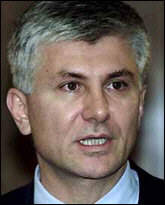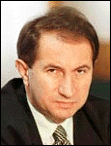 GOVERNANCE GOVERNANCE |
 I. INTRODUCTION I. INTRODUCTION |

The Republic of Serbia, together with the Republic of Montenegro, is a constituent part of the Federal Republic of Yugoslavia, recently named Serbia and Montenegro, in a constitutional form yet to be defined. It contains two autonomous provinces: Vojvodina and Kosovo and Metohija. Belgrade is the capital city. With a population of two millions, it is the administrative, economic and cultural heart of Serbia and Yugoslavia.

Following the October 5th revolution, Serbia entered a transition period. This transition to a market economy and the creation of a modern and law-abiding society is characteristic of all post-communist countries. The transition is embracing all elements of the state, primarily in terms of economic development and change of political conduct, the less important of it not being the fight against corruption, which over the past decade reached into all segments of the society.
 II. BASIC INFORMATION II. BASIC INFORMATION |

Dr. Zoran Djindjic, Prime Minister of the Republic of Serbia
see tables
List of deputies' groups in the National Assembly
see table
 III. THE FEDERAL REPUBLIC OF YUGOSLAVIA (FRY) III. THE FEDERAL REPUBLIC OF YUGOSLAVIA (FRY) |
The FRY consisting of the Republic of Serbia and the Republic of Montenegro, was proclaimed by the will of their people and the Constitution on 27 April 1992. The federal government is made up of a prime Minister, Deputy Prime Minister, and Federal Ministers. It is formed for a four-year term, and it is elected after President of the FRY nominates and the Federal Assembly votes on the candidate, his program and the composition of the Government. The Federal Government shall be considered formed when the Federal Assembly elects the prime Minister of the Federal Government by majority vote of all the federal deputies in each of the two Chambers, by secret ballot.
Federal Government fosters relations between the Federal Republic of Yugoslavia and other states and international organizations, introduces bills for federal statutes, other laws and general enactment, takes care of federal administration's functioning, creates and abolishes federal ministries and other federal agencies and organizations and determines their organization and competencies. Federal Government calls for a general mobilization and organizes defense preparations if necessary, as well as adopts measures regulating matters within the jurisdiction of the Federal Assembly when the Assembly is not able to meet, during an imminent threat of war.
| For its work, the Federal Government is responsible to the Federal Assembly, which may vote of its confidence. A majority of votes of the total number of federal deputies in each of the two chambers shall be required for a vote of no confidence in the federal government. A federal government whose mandate has been terminated shall continue performing its duties until the formation of a new federal government.
The President of the FRY
Dr. Vojislav Koštunica was born in Belgrade in 1944. In 1966, he completed studies at the Faculty of Law, where he received his Masters in 1970, and his Doctorate in 1974. In 1970, he was elected as an Assistant at the Faculty of Law in Belgrade, but in 1974, due to the political proscriptions at that time, he was forced to resign. Much later, in 1989, he declined to accept an offer to be a Professor at the Faculty which he had earlier been forced to leave. Since 1974, he was employed in the Institute for Social Sciences, and from 1981, he worked as a Senior Scientific Associate at the Institute for Philosophy and Social Theory, where he was also for a while appointed as Director of the Institute. He is the author of many publications in the fields of Constitutional Law, political theories and political philosophy.
He has been a member of the editorial staff, as well as the Chief Editor of several dignified journals of law and philosophy, such as The Chancery for Legal and Social Sciences, Philosophical Studies, Philosophy and Society, Theory.
He is a member of the Serbian PEN Centre.
During the Eighties, he became active for the protection of human rights, especially through the Board for the Protection of the Freedom of thought and expression.
In 1989, he was one of the founders of the Democratic Party. He is the President of the Democratic Party of Serbia since it's foundation in 1992. He was a deputy in the Parliament of Serbia from 1990 to 1997.
The Prime Minister of The FRY

DRAGIŠA PEŠIC was born on August 8, 1954, in Danilovgrad.
Completed primary and secondary school in Danilovgrad, and graduated from the Faculty of Economics in Sarajevo in 1977. After graduation he remained in Bosnia and Herzegovina for another five years working as a financial expert in "Vatrostalna" in Zenica. After that he was engaged by "Industriaimport" in Podgorica as a head financial expert.
He started his political career in 1989. He was President of the Municipal Government of Podgorica for two consecutive terms. He was a Director of the united Democratic Party of Socialists.
He was elected Deputy to the Federal Parliament of the Federal Republic of Yugoslavia in 1996, and during that term worked as Chairman of the Federal Budget Committee.
For the first time he was appointed Federal Minister of Finance in 1998, to be re-elected in 2000
He is a member of the Socialist National Party of Montenegro and its top leadership. |

